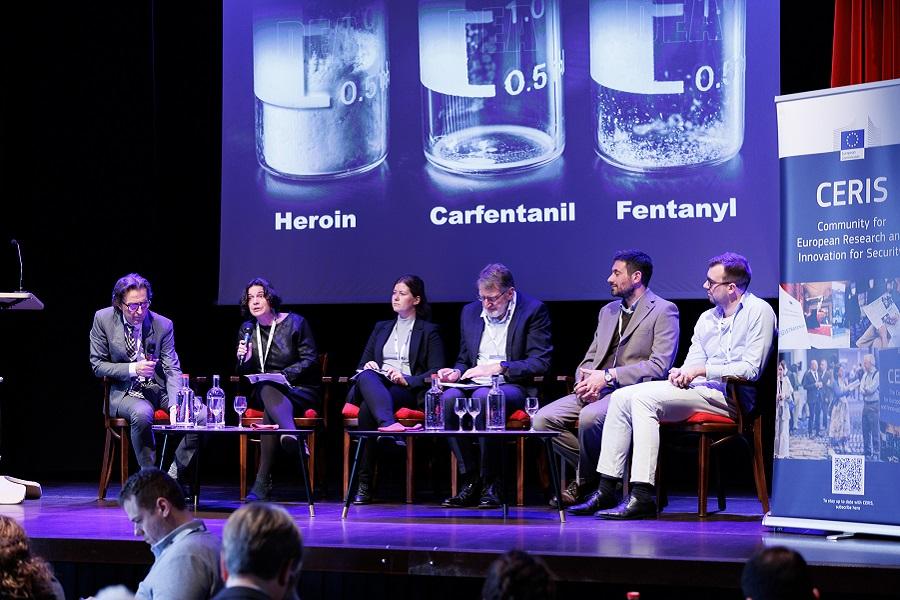
On 21 February 2024, a CERIS workshop on illicit drugs, organised by DG HOME’s Security Research and Innovation Unit HOME.F2, brought together more than 100 participants from police forces, customs and forensic institutes, as well as policymakers, researchers and representatives from civil society and industry.
Under the CERIS banner (CERIS stands for “Community for European Research and Innovation for Security”), the workshop aimed to address the challenges of illicit drugs from different angles. Drug trafficking is highly lucrative for criminals, as demonstrated by the unprecedented increase in illicit drugs available in Europe and the fact that drugs seizures in the EU are hitting record levels. The impact of criminal networks engaged in illicit activities is felt throughout communities and economies, and demands a collective, coordinated response from governments, law enforcement, and private actors in key sectors.
The participants discussed first the latest policy developments, such as the recently adopted EU Roadmap to boost the fight against drug trafficking and organised crime. In addition, the EU is strengthening the mandate of key actors in the fight against drugs trafficking, such as the European Monitoring Centre for Drugs and Drug Addiction (EMCDDA), which will turn into the new EU Drugs Agency in July 2024.
As criminals are increasingly using new technologies such as artificial intelligence, the EU continues investing in innovative solutions for law enforcement agencies to keep pace with technological change, so they keep up and maintain their effectiveness in protecting citizens today and in the future. Therefore the participants discussed such innovative solutions, such as novel information sources for analysing the drug use and drug markets, drugs-related forensics, and innovative sensors for drug detection.
The workshop was opened with speeches from DG HOME Directors Marta Cygan, and Floriana Sipala, presenting the goals of the workshop and analysing key aspects of the EU drugs policy. The keynote speeches, for example by the European Network of Forensic Science Institutes (ENFSI), were focusing on the status of the drug forensics in Belgium, and on the gaps and needs of security practitioners when fighting drugs-related organised crime, which is also a key priority for the Belgian EU Presidency.
The ensuing discussions were organised in three panels. The first panel covered innovative approaches to prevent, detect, monitor and respond to drug-related threats. In the second panel drugs-related organised crime was discussed, while the last panel was dedicated to detecting drugs in cargo shipments and on persons. Panels brought together numerous panellists and moderators, including representatives of EMCDDA, the European Commission, two drug-related working groups of the European Multidisciplinary Platform Against Criminal Threats (EMPACT), dedicated EU security research projects (ARIEN, BorderSens, ENTRANCE, PARSEC, RISEN, PROMENADE, SilentBorder, SMAUG, MELCHIOR) and the ISF-P project NarcoView.
Panellists and participants concluded that the key factor for finding a sustainable solution to the problem of illicit drugs is a strong collective effort and cooperation among various actors (practitioners, policy makers, researchers, industry, civil society) at different levels, including international cooperation. This requires ensuring synergies among police authorities and customs, EMCDDA and the European Network of Forensic Science Institutes (ENFSI), and dedicated research projects.
Participants and panellists agreed that in the battle against drugs, innovation is paramount. For instance, the use of innovative technologies reinforces the ability to detect illicit substances in cargo and individuals in ports and airports, while the role of practitioners is crucial in the innovation process and they provide precious contributions to the EU security research projects, such as operational needs and requirements, but also validation of tools and methods.
Some of the presentations that were given during the day can also be accessed here:
Details
- Publication date
- 9 April 2024
- Author
- Directorate-General for Migration and Home Affairs
